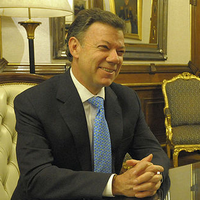A number of recent overtures by Colombian President Juan Manuel Santos toward China have caused concern in Washington and put pressure on Congress to finally pass the free trade agreement (FTA) with Colombia. Although this is probably Santos' intention, the highly publicized moves should actually be understood in the context of his broader efforts to diversify Colombia's foreign policy posture.
In September 2010, one month after his inauguration, Santos accepted $1 million in aid from China to be used to acquire Chinese logistical military equipment. The Chinese government also invited several senior military officers to participate in training courses in China. Although the deal is insignificant when compared to the more than $7.3 billion Bogota has received from Washington under Plan Colombia, the optics of the agreement are far more important than the dollar amount involved. Santos is well aware of the impact that such a deal will have in Washington given China's efforts to become as a major arms supplier to Latin America.
A more recent example of Santos' strategy to capitalize on the "China threat" rhetoric prevalent in Washington is illustrated by his comments on what he characterized as a "real proposal" by China to build a so-called dry canal to connect ports on the Pacific and Atlantic oceans by rail. The $7.6 billion project would threaten the U.S.-built Panama canal's monopoly on trade passing through the region. At least on paper, the 136-mile link would turn Colombia into an important regional hub for trade with the world's No. 2 economy.

